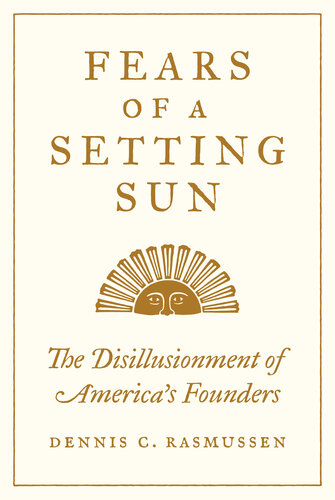
Fears of a Setting Sun
The Disillusionment of America's Founders
کتاب های مرتبط
- اطلاعات
- نقد و بررسی
- دیدگاه کاربران
نقد و بررسی

December 15, 2020
Why the Founding Fathers believed the political system they created was "an utter failure that was unlikely to last beyond their own generation." Making the striking argument that all but one of the major founders of the U.S. died disillusioned with their creation, Rasmussen nevertheless offers hope for our current predicaments. Focusing on George Washington, John Adams, Thomas Jefferson, Alexander Hamilton, and James Madison, the author scrutinizes their surviving papers for a single element of their thought: their confidence in the future of the federal republic. His distinctive approach yields something overlooked by historians. All of them--and there were others--save Madison died pessimistic about their country's future. The partisanship that broke out during Washington's presidency deeply troubled him. Hamilton's dark mood arose from what he saw as the government's feebleness. Adams was forever despondent about his fellow citizens' lack of virtue. Jefferson became deeply anxious about disunion; he went to his death "riddled with doubts" about the young nation's survival. Only Madison--a man less troubled by partisanship, weak government, and the union's breakup and more confident that institutions could offset a lack of public virtue--escaped the other founders' dark forebodings. But should we see their misgivings as the realism of mature reflection or as an indication of an inability to adjust to changes in a distinctive nation whose future has never been foreseeable? While offering an authoritative and convincing argument in disarmingly artful prose, Rasmussen doesn't answer that question. However, while emphasizing the founder's "late-life despair," he ends on a hopeful note. Despite systemic problems that have existed since the nation's founding, our current woes "are less likely to ultimately doom the republic than we often fear"--as long as we follow these great men who, despite their fears, forged ahead until their deaths with "steadfast resolve" to strengthen the nation they'd established and led in its infancy. A relevant history suggesting that the U.S. may be stronger than many of its citizens believe.
COPYRIGHT(2020) Kirkus Reviews, ALL RIGHTS RESERVED.

Starred review from January 4, 2021
Political scientist Rasmussen (The Infidel and the Professor) delivers an illuminating account of how the founding fathers worried about the future of America. With the notable exception of James Madison, Rasmussen writes, the country’s early leaders, including George Washington, John Adams, Thomas Jefferson, and Alexander Hamilton, were pessimistic that the American experiment in republican democracy would endure. Washington’s fears stemmed from concerns that political partisanship would inevitably tear the country “asunder.” Adams distrusted the people’s ability to put aside their self-interest in favor of the greater public good, according to Rasmussen, while Jefferson anticipated that regional divisions—exemplified in differing attitudes toward slavery—would doom the American enterprise. Hamilton, meanwhile, worried that the federal government lacked the energy or authority to successfully govern the states. One factor behind Madison’s relative optimism, Rasmussen notes, was his lower expectations for how the new country would operate. Rasmussen lends weight to his arguments with revealing—and often sobering—quotes from primary sources (Hamilton, for instance, called the Constitution “a frail and worthless fabric”), and enlivens the proceedings with flashes of wit (“with enemies like Jefferson, slavery hardly needed friends”). This standout history provides useful context for understanding the roots of contemporary political turmoils and may comfort those who fear that American democracy is in dire peril.

January 8, 2021
It's comforting to believe that the Founding Fathers of the United States were convinced of the new union's prospects for success. But that isn't the case, as Rasmussen (political theorist, Syracuse Univ; The Infidel and the Professor) proves in this latest work. George Washington, Alexander Hamilton, John Adams, and Thomas Jefferson all had serious doubts about the long-term viability of the fragile republic. Washington feared factionalism. Hamilton believed that states were too strong and the federal government was too weak. Adams lamented the lack of civic virtue among its citizens. Jefferson, an optimist most of his life, succumbed to fear in his later years that slavery would drive the country apart. Only Madison remained optimistic, though he had lived through the Missouri Compromise of 1820 and witnessed the ascension of the first populist president, Andrew Jackson, governing in a manner antithetical to his own. In telling the stories of these Founding Fathers, Rasmussen has produced a well-researched study that is a salutary read. He writes accessibly, explaining what motivated and worried each of these leaders. Concern for future generations and the fate of the republic is a recurring theme, and will also resonated with many readers today. VERDICT Though Written primarily for history lovers, this thought-provoking book may strike a chord with others as well.--David Keymer, Cleveland
Copyright 2021 Library Journal, LLC Used with permission.

























دیدگاه کاربران